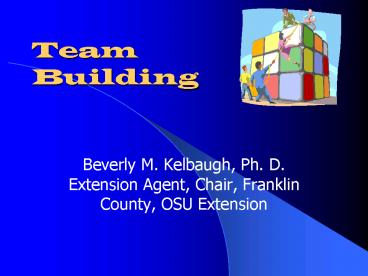Team Building - PowerPoint PPT Presentation
1 / 14
Title:
Team Building
Description:
Use of teams increased dramatically in all organizations in the last decade ' ... and their negative effects mitigated or eliminated (Woodcock & Francis, 1994) ... – PowerPoint PPT presentation
Number of Views:28
Avg rating:3.0/5.0
Title: Team Building
1
Team Building
- Beverly M. Kelbaugh, Ph. D. Extension Agent,
Chair, Franklin County, OSU Extension
2
Teams
- Team is a group of people who work together to
achieve a desired outcome - People become a team when they work together
interdependently and synergistically to
accomplish something. - (Wellins, Byham Wilson, 1991)
- Teamwork is a series of complementary and
mutually reinforcing behaviors completed in a
group (Snow, 1992)
3
Why Teams
- Use of teams increased dramatically in all
organizations in the last decade - Teams are an appropriate structure for
implementing strategies formulated to deal with
performance demands and opportunities presented
by the changing business environment. - (Mohrman, Cohen Mohrman, 1995)
4
Why Teams Cont.
- Teams are recognized as a fit between strategy
and organizational design which leads to a
competitive advantage. - Galbraith, Lawler and Associates, 1993 Nadler,
Gerstein, Shaw and Associates 1992)
5
Purpose of Teambuilding
- Teambuilding is designed to help people who work
together to function more effectively in teams
and to assist the team itself to work more
effectively as a whole - (Moxon, 1993)
6
Team Building
- Teambuilding can be defined as a structured
attempt to improve/develop effectiveness of a
group of people who work together - (Clark, 1994, Moxon,1993)
- Each team member should have a notion of constant
improvement in order for a company or team to
continually improve - (Byham,1990)
7
Teambuilding
- A deliberate process of facilitating the
evolution of a close and effective work group so
that - Team leadership is coherent, visionary and
acceptable - The teams roles, functions and deliverables are
clearly understood - Members of the team have emotionally signed up
and dedicated their efforts to collective
achievement - There is positive, energetic and empowering
climate in the work group - Informal and formal meetings are efficient and
make good use of time and available resources - Weaknesses in team capability have been diagnosed
and their negative effects mitigated or
eliminated (Woodcock Francis, 1994)
8
Teambuilding
- The best teambuilding happens when selected
activities meet identified needs of the team or
address as needed skills and competencies. - Teambuilding in a workplace is a task-oriented
activity. The task alone provides the context in
which it becomes appropriate to discuss processes
and procedures and individual behavior - (Moxon, 1993)
9
Teams
- Teams can allow Extension and other organizations
to be more responsive in dealing with new demands
and opportunities in a rapidly changing world. - Allow for organizational flexibility
- Integration of knowledge , experience and
perspective that cannot be held by one person.
(Donnellon, 1996)
10
Why Teams are Important in Extension
- Teams represent an aspect of teaching that,
enables learning beyond the campus walls, that
aspect of research that makes what we discover
useful beyond the academic community and that
aspect of service directly benefiting the public - (OSU 1995 Council for Outreach and Engagement)
11
Effective Teams
- Effective teams are self-directed and are made up
of small groups of people empowered to manage
themselves and the work they do on a daily
basis. (Wellins, Byuham Wilson, 1991)
12
Types of Teams
- Leader Directed
- Leader Facilitated
- Leader Coached
- Empowered Team
13
Characteristics of Effective Teams
- Team leadership
- Team direction
- Information
- Team processes
- Clear roles and responsibilities
- Adequate resources
- Physical
- Human
- Financial
14
Stages of Team Development
- Forming
- Storming
- Norming
- Performing

